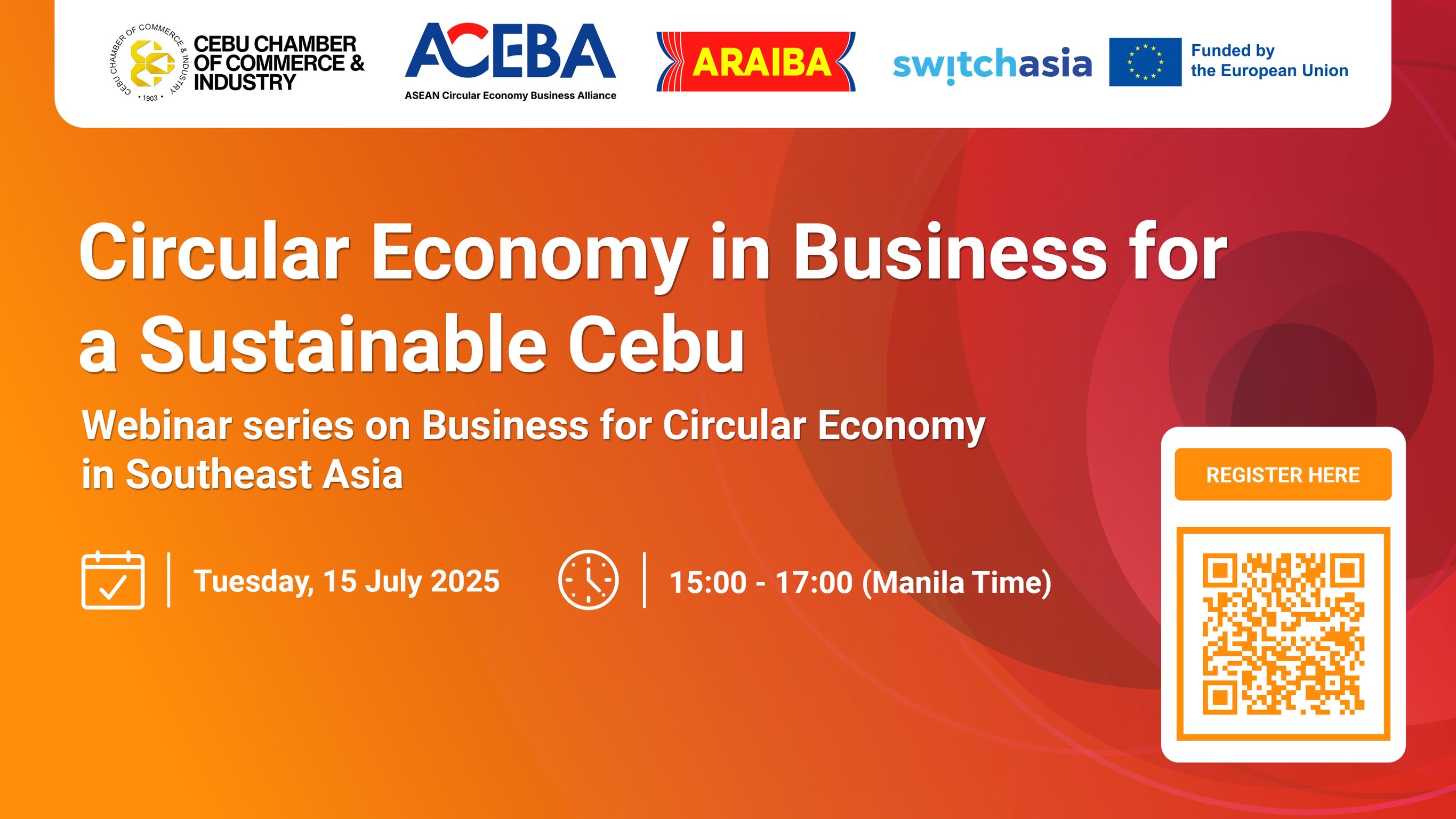Circular Economy in Business for a Sustainable Cebu

WHEN: 15 July 2025 I TIME: 15:00 – 17:00 (Manila Time); 14:00 – 16:00 (Bangkok Time) I Watch the recording HERE
Background
Circular economy takes a system’s perspective on the use and disposal of natural resources in the economy and society, to bring both the net inflows and net outflows of natural resources as close as possible to zero. For business, this involves taking responsibility for the impacts on the global environment of the use and disposal of materials, energy, water, and possibly other natural resources in its products, services, and business operations, taking a life cycle perspective. Beyond the planetary necessity, the circular economy provides a solid platform for businesses to perform well and do good, through cost savings, new business opportunities, and improved resilience and preparedness. In doing so, businesses contribute to the inclusive and sustainable development of the communities, regions, and localities they operate in.
Cebu province and the Cebu Chamber of Commerce and Industry at the forefront in championing circular economy reforms
The Cebu provincial and city governments, over the years, have shown commitment to catalysing the sustainable development of the province and of its cities, which includes mandating sustainability and circular economy practices in the private sector. In 2013, the Sangguniang Panlalawigan of Cebu issued an ordinance establishing the “Our Sustainable Cebu Program” that sought to recognize through awards and provide incentives to participating LGUs and businesses[1]. Metro Cebu cities (Mandaue City and Cebu City) have issued sustainable ordinances such as Mandaue City’s Green Building Ordinance and use of the Building for Ecologically Responsive Design Excellence (BERDE) Green Building Rating System[2], and Cebu City’s ordinance requiring businesses to submit an environmental sustainability action plan (ESAP) for permit renewal[3]. Some economic zones in Metro Cebu, such as the Cebu Business Park, have shown greater green potential--through their solid waste management practices, green gas emission management, and lighting system--and local micro, small, and medium enterprises (MSMEs) have been engaged and shown promise in a number of pilot projects, such as the Green Economic Development (GED) project[4] and SMART Cebu Project,[5] to mainstream green business initiatives and local-international green markets matchmaking.
The Cebu Chamber of Commerce and Industry (CCCI) is spearheading the adoption of responsible business and circular economy practices with its members and the Cebu business community at large. Amongst others, it serves as the Country Lead for the Philippines in the ASEAN Circular Economy Business Alliance (ACEBA), positioning the Chamber at the forefront of circular economy transition in the province of Cebu, the Visayas region, and Southeast Asia. As the voice of business, CCCI remains steadfast in and committed to advocating for policies and regulations that encourage circular economy practices, such as supporting the Extended Producers' Responsibility (EPR) Act, waste reduction targets, and incentives for businesses to adopt circular business models.
Webinar Session
This webinar is organized to deepen conversation in the public and private sector on emerging and practical opportunities as well as critical challenges for business leadership and action on circular economy towards Cebu’s sustainable development. Picking up from the introductory workshop facilitated with the CCCI last February[6], this webinar will elaborate on the contribution of CE to sustainable city and regional development, and CE experience of and innovation by selected ASEAN and Philippine companies. It also aims to engage the local government of Cebu in current efforts to promote sustainability, responsibility, and circularity among local businesses.
This webinar is co-organized by the CCCI and the ASEAN Circular Economy Business Alliance (ACEBA)[7], an ASEAN-centric initiative for and of businesses that fosters private sector CE leadership and action. ACEBA was launched in July 2024 under the auspices of the ASEAN Business Advisory Council (ASEAN BAC) and with technical assistance from the EU SWITCH-Asia Policy Support Component (PSC), and is inspired by the results of circular economy business engagements in the Philippines, Cambodia, Indonesia, Thailand and Vietnam that yielded 80+ CE business cases[8].
Agenda
|
15:00 – 15:03 |
Introduction, Programme overview and webinar guidelines |
Mary Grace SANTOS, national expert, EU SWITCH-Asia PSC |
|
15:03 - 15:10 |
Welcome Remarks: Responsible business driving circular economy and sustainable development |
Thomas THOMAS, Co-convenor ACEBA, Chairman ARAIBA Sdn Bhd, and senior expert, EU SWITCH-Asia PSC |
|
15:10 – 15:20 |
Welcome Remarks: Business leadership for the sustainable development of Cebu |
Jay Yuvallos, President, Cebu Chamber of Commerce and Industry |
|
15:20 – 15:30 |
Circular Economy: Business leadership for locally appropriate sustainability solutions |
Rene VAN BERKEL, co-convenor ACEBA, senior expert, EU SWITCH-Asia PSC, and faculty Thammasat University |
|
15:30 – 15:35 |
Video: Business for Circular Economy in Southeast Asia |
|
|
15:35 – 16:15 |
Panel 1: Sustainability and circularity: Policy and action by city governments, and existing support mechanisms
|
Moderated by GIL GONZALEZ, co-convenor, ACEBA |
|
16:15 – 16:50 |
Panel 2: Circular economy business practices in the Philippines
|
Moderated by Thomas THOMAS |
|
16:50 – 16:55 |
Reflection and ways forward |
Moderated by Rene VAN BERKEL, co-convenor ACEBA, senior expert, EU SWITCH-Asia PSC, and faculty Thammasat University |
|
16:55 – 17:00 |
Closing remarks |
Dr. Zinaida Fadeeva, Team Leader, EU SWITCH-Asia PSC |
[1] https://www.scribd.com/document/576570178/Cebu-Sustainable-Program
[2] https://www.greenpolicyplatform.org/sites/default/files/downloads/best-practices//Green%20Growth%20in%20Cebu%2C%20Philippines_0.pdf, p. 81
[3] https://www.philstar.com/the-freeman/cebu-news/2024/11/23/2402337/businesses-now-required-have-environmental-sustainability-plan
[4] https://www.greenpolicyplatform.org/sites/default/files/downloads/best-practices//Green%20Growth%20in%20Cebu%2C%20Philippines_0.pdf, p. 74-75
[5] https://www.switch-asia.eu/site/assets/files/1924/switch_asia_impact_sheet_-_2014_-_smart_cebu.pdf
[6] https://www.aceba.co/blog/cebu-chamber-of-commerce-and-industry-signs-circular-economy-partnership-for-the-philippines/
Share:
